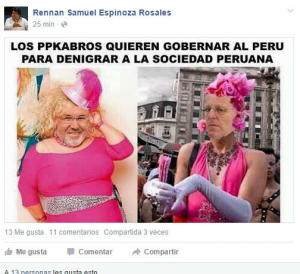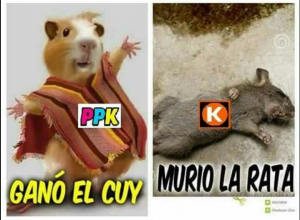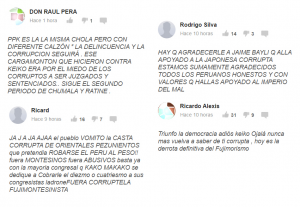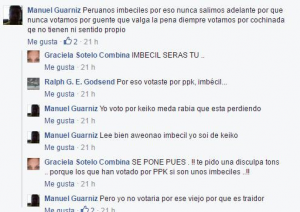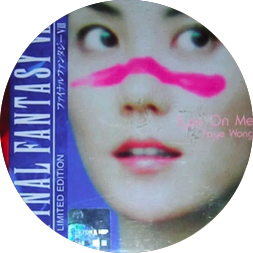
Runoffs of the 2016 elections in Peru, the winner still isn’t clear. However, what dominated most online messages was voting driven for anger.
The streets were calm and peaceful, but online, a storm was brewing. Once again, I witnessed the Peruvian voter prioritizing their hatreds over their interests. While the first round was chaotic, the second round was a breeze, allowing me to fulfill my civic duty without hassle.
In a more developed society, voting would be voluntary. Instead, Peruvians are still obligated to vote. Peru is a beautiful country with a rich history, but these 2016 elections have left me with a bitter taste. While its people are known for their warmth, a significant portion of the population harbors a dark, ugly, and hidden side.
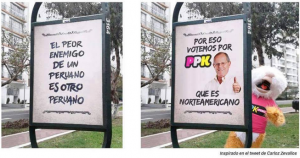
This vicious cycle cuts across all social and political divides, affecting the rich and poor, the left and right, men and women alike.”
A Peruvian’s worst enemy
As the saying goes, “A Peruvian’s worst enemy is another Peruvian.” This sentiment has never been more evident than during the recent elections, where political discourse has descended into a toxic pit of mudslinging, personal attacks, and unbridled animosity. It’s disheartening to witness how, instead of voting for the betterment of their country.
Peruvian voters seem more driven by a desire to oust their opponents than to embrace constructive solutions. This vicious cycle cuts across all social and political divides, affecting the rich and poor, the left and right, men and women alike. Hate knows no boundaries of gender, race, or social status, and the Peruvian electorate has displayed this in stark clarity during these recent elections.
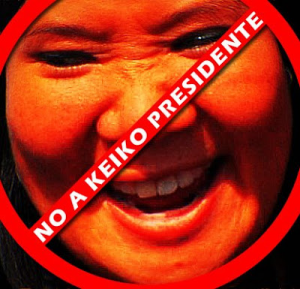
The insults and slander hurled between politicians are a reflection of the deep-seated animosity that many Peruvians harbor.”
The tangled web of polítics
Los insultos y calumnias que saltan entre los políticos son muestras del que padecen muchas personas nacidas en el Perú. Y detrás de cada agravio político graficado por la prensa hay una miríada de comentarios disonantes entre los bandos beligerantes. Todo indica que desde ahora las guerrillas se van a llevar via redes sociales donde cualquie agravio parece estar permitido.
When it comes to hating, Peruvians don’t hold back. In fact, they do it with flair and eloquence. And with social media becoming increasingly embroiled in media scandals, it’s no surprise that election season brings out the worst in Peruvian vitriol.
The insults and slander hurled between politicians are a reflection of the deep-seated animosity that many Peruvians harbor. And behind every politically charged outrage splashed across the headlines lies a cacophony of discordant commentary from the warring factions. It seems that the battleground has shifted to social media, where any grievance seems to be fair game.
To make matters worse, their respective parties have been playing dirty, often with the support of biased media outlets.”
Enemy mine
The 2016 election has become a voting driven for anger, with both candidates, Pedro Pablo Kuczynski and Keiko Sofia Fujimori, being labeled as traitors, thieves, lobbyists, and pro-terrorists, among other things. To make matters worse, their respective parties have been playing dirty, often with the support of biased media outlets.
This has created a toxic environment where insults are hurled at every opportunity, leaving the country deeply divided. It’s a sad reflection of the state of Peruvian politics, where the focus seems to be on tearing each other down rather than finding common ground.

This negative campaigning only served to deepen the rifts within society, making it even more difficult for voters to find common ground.”
The Losers
As the election season drew to a close, it became increasingly clear that the candidates were more interested in pointing out each other’s flaws than in proposing their own solutions. This led to a further polarization of an already divided society, with voters left feeling disillusioned and disengaged. This negative campaigning only served to deepen the rifts within society, making it even more difficult for voters to find common ground.
In the end, the two remaining candidates failed to offer their supporters a choice between the best of what was left. Instead, they continued to focus on their opponents’ weaknesses, further alienating voters and reinforcing the idea that the election was not about choosing the best candidate, but rather about preventing the worst one from winning. This is a sad reality, but it is one that we must face if we want to build a more united and prosperous future.
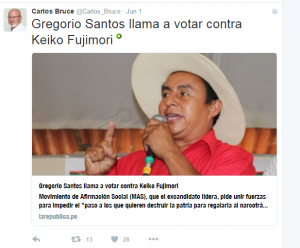
The toxic behavior of these losing candidates exposed their true colors, revealing a deep-seated lack of maturity and responsibility.”
Flame wars.
In the aftermath of the recent elections, a disturbing trend emerged among some of the losing candidates. Instead of gracefully accepting defeat and encouraging their supporters to unite behind the winning candidate, they chose to sow discord and division. They weaponized social media, manipulating their followers to attack the candidate they deemed the most undesirable.
But the reality, unfortunately, is that the majority of people are spewing their hatred towards one candidate or another.”
Things just keep going downhill
It’s disheartening to see that despite their political differences, these Peruvians share one common trait: voting driven for anger. I’ve been cringing as I’ve scrolled through the vitriol that both sides have been spewing on social media. It’s even more upsetting when these same people claim to love their country. That feels like a huge contradiction to me.
I believe it’s possible to have strong political opinions without resorting to denigrating those who disagree with you. But the reality, unfortunately, is that the majority of people are spewing their hatred towards one candidate or another. This election has exposed not only the worst in our candidates but also the deep-seated animosity of the Peruvian people as a whole.
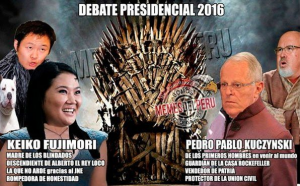
If my candidate doesn’t win and I’m still around, there will be another election in five years to try again.”
Final thoughts.
In this 2016 election, I chose to simply cast my vote for the candidate I’ve consistently believed in. Now, it’s a waiting game, hoping that whoever wins will lead a better government than the current one. Once the election frenzy dies down, no one will try to change anything until the next five years roll around and the cycle repeats.
Despite the negative atmosphere surrounding these elections, there’s always room for hope. If my candidate doesn’t win and I’m still around, there will be another election in five years to try again. And I’ll go to that election with the confidence that my vote is not driven by hate.
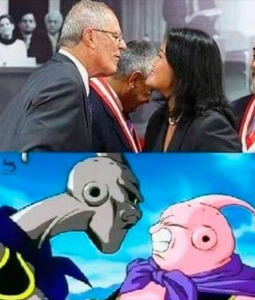
Meet you at the next entry.

